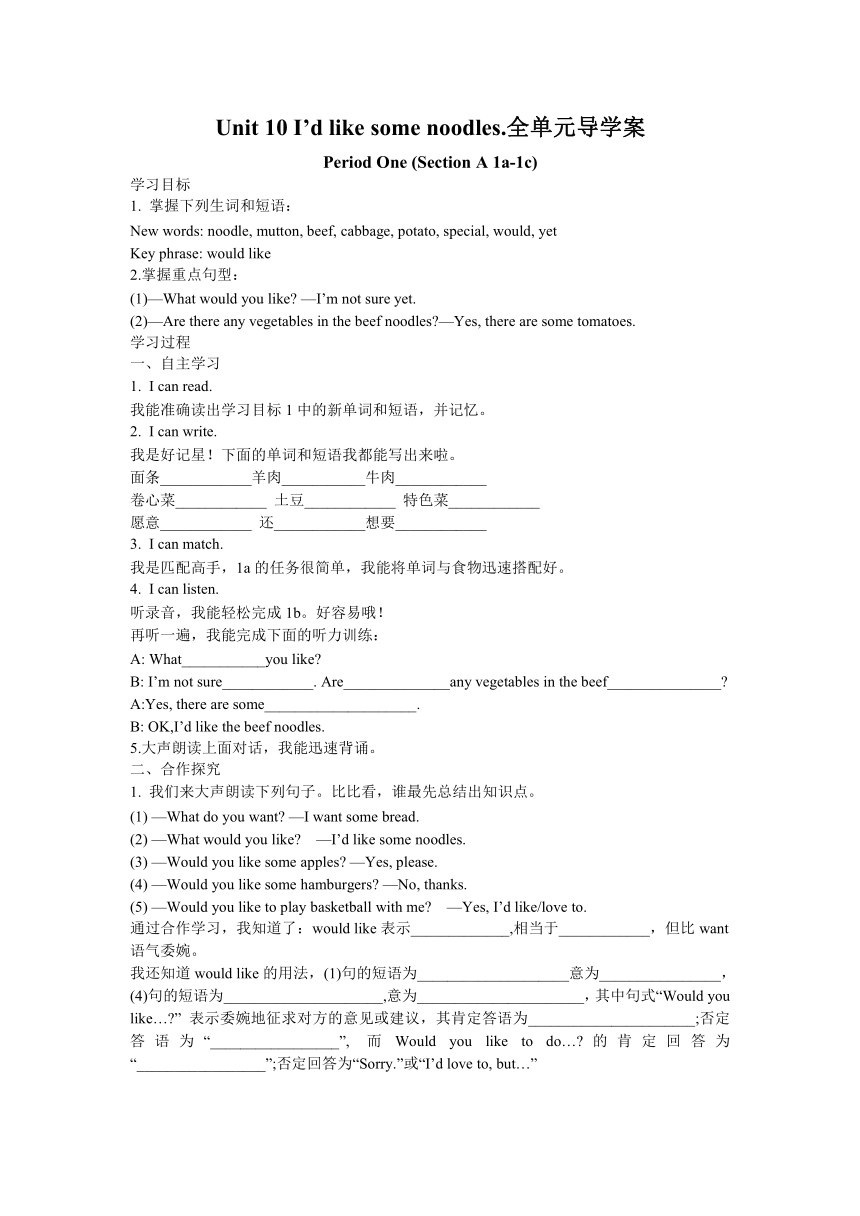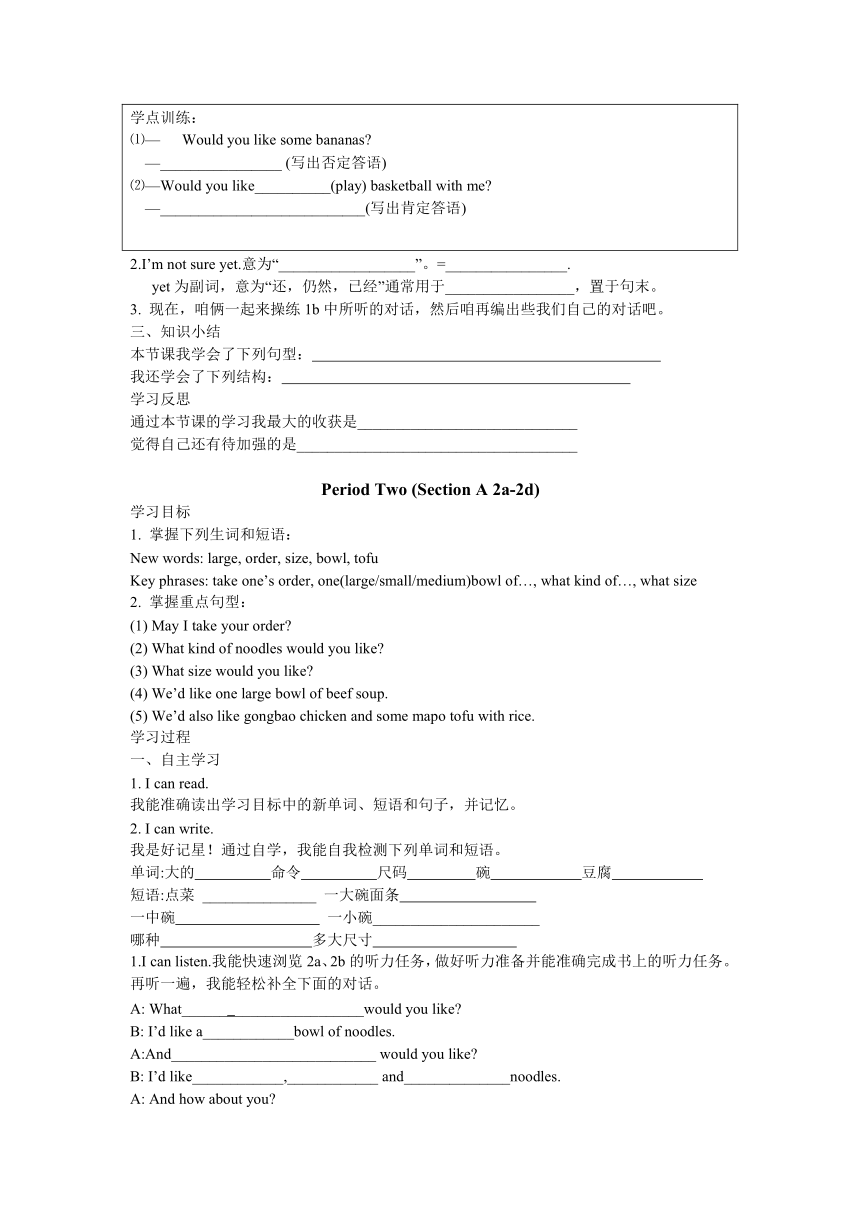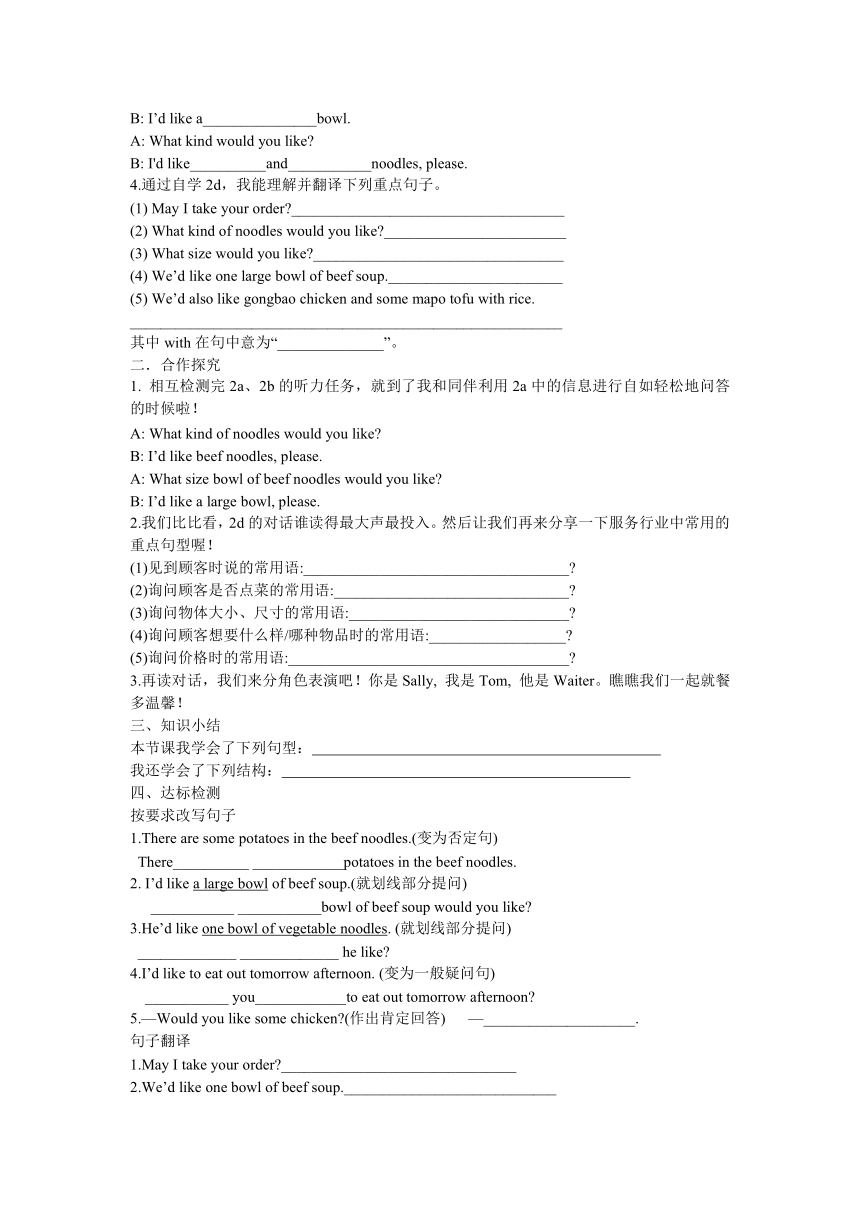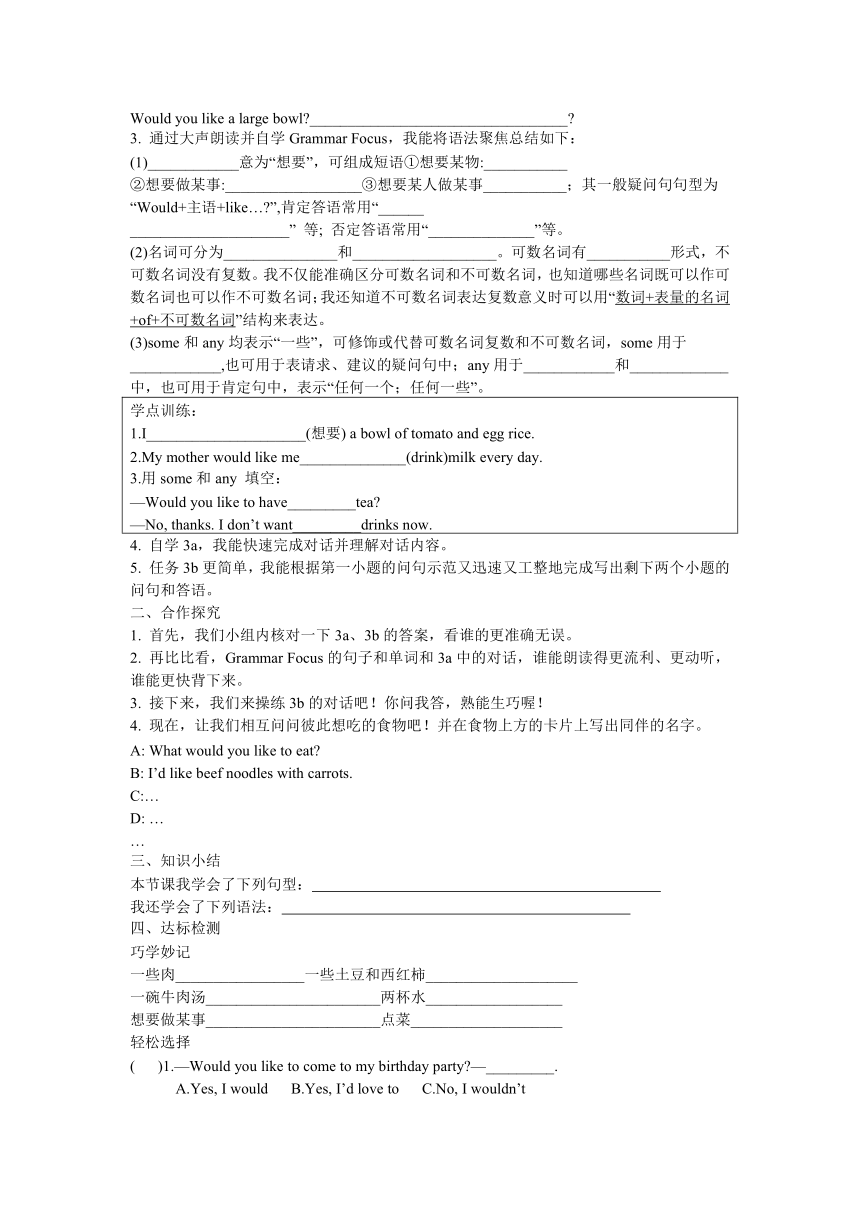Unit 10 I’d like some noodles. 全单元导学案6课时
文档属性
| 名称 | Unit 10 I’d like some noodles. 全单元导学案6课时 |  | |
| 格式 | zip | ||
| 文件大小 | 25.7KB | ||
| 资源类型 | 教案 | ||
| 版本资源 | 人教新目标(Go for it)版 | ||
| 科目 | 英语 | ||
| 更新时间 | 2013-05-07 16:22:43 | ||
图片预览





文档简介
Unit 10 I’d like some noodles.全单元导学案
Period One (Section A 1a-1c)
学习目标
掌握下列生词和短语:
New words: noodle, mutton, beef, cabbage, potato, special, would, yet
Key phrase: would like
2.掌握重点句型:
(1)—What would you like —I’m not sure yet.
(2)—Are there any vegetables in the beef noodles —Yes, there are some tomatoes.
学习过程
自主学习
I can read.
我能准确读出学习目标1中的新单词和短语,并记忆。
I can write.
我是好记星!下面的单词和短语我都能写出来啦。
面条____________羊肉___________牛肉____________
卷心菜____________ 土豆____________ 特色菜____________
愿意____________ 还____________想要____________
I can match.
我是匹配高手,1a的任务很简单,我能将单词与食物迅速搭配好。
I can listen.
听录音,我能轻松完成1b。好容易哦!
再听一遍,我能完成下面的听力训练:
A: What___________you like
B: I’m not sure____________. Are______________any vegetables in the beef_______________
A:Yes, there are some____________________.
B: OK,I’d like the beef noodles.
5.大声朗读上面对话,我能迅速背诵。
合作探究
我们来大声朗读下列句子。比比看,谁最先总结出知识点。
(1) —What do you want —I want some bread.
(2) —What would you like —I’d like some noodles.
(3) —Would you like some apples —Yes, please.
(4) —Would you like some hamburgers —No, thanks.
(5) —Would you like to play basketball with me —Yes, I’d like/love to.
通过合作学习,我知道了:would like表示_____________,相当于____________,但比want语气委婉。
我还知道would like的用法,(1)句的短语为____________________意为________________,(4)句的短语为_____________________,意为______________________,其中句式“Would you like… ” 表示委婉地征求对方的意见或建议,其肯定答语为______________________;否定答语为“_________________”, 而Would you like to do… 的肯定回答为“_________________”;否定回答为“Sorry.”或“I’d love to, but…”
学点训练:Would you like some bananas —________________ (写出否定答语)⑵—Would you like__________(play) basketball with me —___________________________(写出肯定答语)
2.I’m not sure yet.意为“__________________”。=________________.
yet为副词,意为“还,仍然,已经”通常用于_________________,置于句末。
3. 现在,咱俩一起来操练1b中所听的对话,然后咱再编出些我们自己的对话吧。
三、知识小结
本节课我学会了下列句型:
我还学会了下列结构:
学习反思
通过本节课的学习我最大的收获是_____________________________
觉得自己还有待加强的是_____________________________________
Period Two (Section A 2a-2d)
学习目标
1. 掌握下列生词和短语:
New words: large, order, size, bowl, tofu
Key phrases: take one’s order, one(large/small/medium)bowl of…, what kind of…, what size
2. 掌握重点句型:
(1) May I take your order
(2) What kind of noodles would you like
(3) What size would you like
(4) We’d like one large bowl of beef soup.
(5) We’d also like gongbao chicken and some mapo tofu with rice.
学习过程
一、自主学习
1. I can read.
我能准确读出学习目标中的新单词、短语和句子,并记忆。
2. I can write.
我是好记星!通过自学,我能自我检测下列单词和短语。
单词:大的 命令 尺码 碗 豆腐
短语:点菜 _______________ 一大碗面条
一中碗 一小碗______________________
哪种 多大尺寸
I can listen.我能快速浏览2a、2b的听力任务,做好听力准备并能准确完成书上的听力任务。再听一遍,我能轻松补全下面的对话。
A: What________________________would you like
B: I’d like a____________bowl of noodles.
A:And___________________________ would you like
B: I’d like____________,____________ and______________noodles.
A: And how about you
B: I’d like a_______________bowl.
A: What kind would you like
B: I'd like__________and___________noodles, please.
4.通过自学2d,我能理解并翻译下列重点句子。
(1) May I take your order ____________________________________
(2) What kind of noodles would you like ________________________
(3) What size would you like _________________________________
(4) We’d like one large bowl of beef soup._______________________
(5) We’d also like gongbao chicken and some mapo tofu with rice.
_________________________________________________________
其中with在句中意为“______________”。
二.合作探究
相互检测完2a、2b的听力任务,就到了我和同伴利用2a中的信息进行自如轻松地问答的时候啦!
A: What kind of noodles would you like
B: I’d like beef noodles, please.
A: What size bowl of beef noodles would you like
B: I’d like a large bowl, please.
2.我们比比看,2d的对话谁读得最大声最投入。然后让我们再来分享一下服务行业中常用的重点句型喔!
(1)见到顾客时说的常用语:___________________________________
(2)询问顾客是否点菜的常用语:_______________________________
(3)询问物体大小、尺寸的常用语:_____________________________
(4)询问顾客想要什么样/哪种物品时的常用语:__________________
(5)询问价格时的常用语:_____________________________________
3.再读对话,我们来分角色表演吧!你是Sally, 我是Tom, 他是Waiter。瞧瞧我们一起就餐多温馨!
三、知识小结
本节课我学会了下列句型:
我还学会了下列结构:
四、达标检测
按要求改写句子
1.There are some potatoes in the beef noodles.(变为否定句)
There__________ ____________potatoes in the beef noodles.
2. I’d like a large bowl of beef soup.(就划线部分提问)
___________ ___________bowl of beef soup would you like
3.He’d like one bowl of vegetable noodles. (就划线部分提问)
_____________ _____________ he like
4.I’d like to eat out tomorrow afternoon. (变为一般疑问句)
___________ you____________to eat out tomorrow afternoon
5.—Would you like some chicken (作出肯定回答) —____________________.
句子翻译
1.May I take your order _______________________________
2.We’d like one bowl of beef soup.____________________________
3.你要什么样的面条?_____________________________________
4.你想要多大(碗)的?________________________________
5.我们还要宫保鸡丁和一份带有米饭的麻婆豆腐。
_____________________________________________________.
补全对话
A: Good afternoon. ________________________________
B: Yes. Are there any noodles
A:Yes. There are some.______________________________________
B: We’d like beef noodles.
A: OK. _______________________________
B: I’d like a medium bowl of beef noodles..
A: And_____________________________
C: Large, please.
A: OK. One medium bowl and one large bowl.
B: Yes, .Thank you.
学习反思
通过本节课的学习我最大的收获是_____________________________
觉得自己还有待加强的是_____________________________________
Period Three (Section A Grammar Focus-3c)
学习目标
1.掌握下列生词和短语:
New word: meat
Key phrases: have one’s order, would like to do sth.
2.掌握重点句型:
(1)May I have your order
(2)What kind of noodles do you have
(3)What size do you have
(4) Would you like a large bowl
(5)What would you like to eat
3.掌握语法:
(1)would like的用法。
(2)可数名词与不可数名词。
(3)some与any的用法。
学习过程
自主学习
1. I can read.
我能准确读出学习目标中的新单词、短语和句子,并记忆。
2. I can write.
我是好记星!我能自我检测下列单词、短语和句子。
肉 想要做某事 点菜_________________
你想吃什么?______________________________________________
May I have your order ________________________________________
What kind of noodles do you have ______________________________
What size do you have _______________________________________
Would you like a large bowl __________________________________
通过大声朗读并自学Grammar Focus,我能将语法聚焦总结如下:
(1)____________意为“想要”,可组成短语①想要某物:___________
②想要做某事:__________________③想要某人做某事___________;其一般疑问句句型为“Would+主语+like… ”,肯定答语常用“______
_____________________” 等; 否定答语常用“______________”等。
(2)名词可分为_______________和___________________。可数名词有___________形式,不可数名词没有复数。我不仅能准确区分可数名词和不可数名词,也知道哪些名词既可以作可数名词也可以作不可数名词;我还知道不可数名词表达复数意义时可以用“数词+表量的名词+of+不可数名词”结构来表达。
(3)some和any均表示“一些”,可修饰或代替可数名词复数和不可数名词,some用于____________,也可用于表请求、建议的疑问句中;any用于____________和_____________中,也可用于肯定句中,表示“任何一个;任何一些”。
学点训练:1.I_____________________(想要) a bowl of tomato and egg rice.2.My mother would like me______________(drink)milk every day.3.用some和any 填空:—Would you like to have_________tea —No, thanks. I don’t want_________drinks now.
自学3a,我能快速完成对话并理解对话内容。
任务3b更简单,我能根据第一小题的问句示范又迅速又工整地完成写出剩下两个小题的问句和答语。
合作探究
首先,我们小组内核对一下3a、3b的答案,看谁的更准确无误。
再比比看,Grammar Focus的句子和单词和3a中的对话,谁能朗读得更流利、更动听,谁能更快背下来。
接下来,我们来操练3b的对话吧!你问我答,熟能生巧喔!
现在,让我们相互问问彼此想吃的食物吧!并在食物上方的卡片上写出同伴的名字。
A: What would you like to eat
B: I’d like beef noodles with carrots.
C:…
D: …
…
知识小结
本节课我学会了下列句型:
我还学会了下列语法:
达标检测
巧学妙记
一些肉_________________一些土豆和西红柿____________________
一碗牛肉汤_______________________两杯水__________________
想要做某事_______________________点菜____________________
轻松选择
( )1.—Would you like to come to my birthday party —_________.
A.Yes, I would B.Yes, I’d love to C.No, I wouldn’t
( )2.—Are there__________people in the park
—Yes, there are___________boys and girls playing games.
A.some, some B.any, some C.any, any
( )3.—Can I help you —Yes.We want ___________.
A.two cups of teas B.two cup of tea C.two cups of tea
( )4.—What are you going to do this weekend
—I’d like___________my grandparents.
A.visit B.visiting C.to visit
( )5.Some oranges______in the bag. Some mutton______on the table.
A.are, are B.is, is C.are, is
口语交际
1.—________________________________________
—I’d like some potato salad.
2.—__________________________________________
—I’d like a small bowl of rice.
3.—Is there any meat in the tomato and egg soup
—______________________________________.
4.—Would you like some milk
—_______________________________
5.—Would you like something to eat
—________________________________.
学习反思
通过本节课的学习我最大的收获是_____________________________
觉得自己还有待加强的是_____________________________________
Period Four (Section B 1a-1d)
学习目标
1.掌握下列生词和短语:
New words: dumlpling, porridge, onion, fish, pancake
Key phrases: green tea, orange juice, order form
2.掌握重点句型:
(1)I like dumplings, fish and orange juice.
(2)I don’t like onions, green tea or porridge.
学习过程
自主学习
1. I can read.
我能准确读出学习目标中的新单词、短语和句子,并记忆。
2. I can write.
我是好记星!我能自我检测下列单词、短语和句子。
饺子 粥 洋葱_________________
鱼 烙饼 绿茶_________________
橙汁 订单_____________________
我喜欢饺子、鱼和橙汁。______________________________________
我不喜欢洋葱、绿茶和粥。_____________________________________
3.I can match.
我是匹配高手,1a的任务很简单,我能将单词与图片迅速搭配好。
4.呵呵!看着1a中自助餐厅里的美食,我可清楚自己的喜好了!瞧,我能快速标注出自己喜欢和不喜欢的食物喔!
5.听力热身。在听录音之前,我能认真熟读下面的电话订单,并明了1c的听力任务。
A: Hello! House of Dumplings!
B: Hello! I want to order some food, please.
A: Sure.
B: I’d like chicken, fish and cabbage, please.
A: Uh-huh.
B: And twelve dumplings.
A: What kind of dumplings would you like
B: Beef and carrot dumplings, please.
A: OK. What else
B: Umm…I’d like some soup, too.
A: OK. What kind of soup would you like
B: Tomato soup.
A: OK, one tomato soup then. Would you like any drinks
B: One large green tea and two small orange juices.
A: OK. What’s your address, please
B: 15 North Street.
A: And what’s your telephone number
B: 398-2845.
A: 398-2845
B: Yup.
A: Thank you. That’ll be 65 yuan.
6. I can listen.仔细听录音,我能轻松完成1c的表格哦!再听一遍录音,认真检查核对好自己的答案喔!
合作探究
1.比比看,1a中的单词和短语谁得最标准最大声吧!
2.让我们用句型“I like…and…, but I don’t like…or…”来相互说说自己喜欢和不喜欢的食品吧!
3.大声朗读并操练1c的听力内容, 让我们再来熟悉熟悉如何电话订购食物吧!
知识小结
本节课我学会了下列句型:
我还学会了下列语法:
学习反思
通过本节课的学习我最大的收获是_____________________________
觉得自己还有待加强的是_____________________________________
Period Five (Section B 2a-2c)
学习目标
1. 掌握下列生词和短语:
New words: world, answer, different, cake, candle, age, blow, if, will, the UK, candy, lucky, popular, idea
Key phrases: on one’s birthday, around the world, the number of…, make a wish, blow out, in one go, come true, be lucky, get popular, cut up, good luck, be different, be the same, bring good luck to…
2. 掌握重点句子:
(1) The number of candles is the person’s age.
(2) The birthday person must make a wish and blow out the candles.
(3) If he or she blows out al the candles in one go, the wish will come true.
(4) In China, it is getting popular to have cake on your birthday.
(5) They bring good luck to the birthday person.
学习过程
自主学习
1.我能准确读出学习目标中的新单词、短语和句子,并记忆。现在让我来自我检测一下单词吧!
世界_______________答案、回答_____________不同的___________ 蛋糕_______________蜡烛___________年龄_________吹__________
如果_______________将要___________英国_________糖果________ 幸运的___________受欢迎的_______________想法、主意__________
2.通过认真阅读2b这篇关于食物传统的文章,我能完成文章后面的表格。
3.再次阅读课文,我能快速回答2c中的4个问题。
How can a person make his or her birthday wish come true
___________________________________________________
What do people in the UK sometimes put in a birthday cake
___________________________________________________
Why do people never cut up birthday noodles in China
____________________________________________________
Why do people eat special foods on their birthday
____________________________________________________
4.通过大声朗读文章,我能找出文中的重点短语。
想要做某事___________________在某人的生日里________________
…的数量_____________________世界各地_____________________
许愿_________________________吹灭__________________________
受欢迎_______________________切碎__________________________
幸运_________________________好运__________________________
给某人带来好运_____________________________________________
一口气/一次性地_________________实现______________________
相同_____________________不同______________________________
5.我真棒!我还能轻松翻译课文咧!
合作探究
1.我们大家都盼着过生日,更喜欢过生日。那么“What do you do or eat on your birthday ” ,下面让我们来分享一下你的心愿吧!
2.然后我们小组内核对一下2b、2c的答案吧,看谁的最准确无误。
3.现在,让我们来探究学习下面几个句子吧!
(1)The number of candles is the person’s age.
(2) If he or she blows out all the candles in one go, the wish will come true.
通过小组讨论和查阅参考书,我知道了:
the number of…意为________________________, 作主语时,谓语动词用_____________形式;而a number of…意为_____________, 作主语时谓语动词用_____________形式;在含有if引导的条件状语从句的复合句中,主句用一般将来时( will+_____________),if从句用一般现在时。
学点训练:1.A number of students_______(be)having lunch in the dining hall. The number of the students_______ (be)about 400. 2.Tom______________(swim)tomorrow if it__________(be)fine.3.Mary______________(help)her mother cook if she_______(have)time tonight.
4.瞧,我们多聪明!对于今天所学内容,我们还可以拓展很多知识喔!我们小组比比看,谁补充的多喔!
…的答案______________________回答问题____________________
与…不同______________________与…相同____________________
在世界上______________________在…岁时____________________
受某人的欢迎__________________好主意______________________
把它切碎_________(温馨助记:动副短语:动词+人称代词宾格+副词)
5.最后,我们一起来比赛,看谁能将2b中的文段读得最流利,最动听,看谁能最先背下来。
三、知识小结
本节课我学会了下列句型:
我还学会了下列结构:
学习反思
通过本节课的学习我最大的收获是_____________________________
觉得自己还有待加强的是_____________________________________
Period Six (Section B 3a-Self Check)
学习目标
1.学会写食品广告。
2.能自我检测本单元所学知识。
学习过程
一、自主学习
1. I can read.
通过认真阅读3a中的广告,我能用方框中的单词将广告补充完整。
2.再大声朗读课文,我能轻松理解并翻译这则广告。
3.I can write.我是个小小美食家,我拥有自己的甜点屋。现在就来看看我这特色甜点屋里的食物和价格吧,价廉物美,超值喔!亲爱的朋友们,走过路过,千万别错过我这别致的甜点屋噢!
Dessert House
____________________ to eat delicious desserts Here we have three kinds of desserts: small, medium and large.You can ______our special desserts.
A small dessert________strawberries, bananas and ice cream is 5 RMB. It’s very good. A medium dessert____apples, tomatoes and cheese is 6 RMB. It’s very delicious.A large dessert ________pears, potatoes and ice cream is 8 RMB.
Welcome ________ our house and ____________ yourselves!
4.I can check myself.
我能圈出第一部分中不同类的单词,也能用there be 句型的正确形式将第二部分的对话补充完整。
5.I can write. 我真棒!我能在所给提示的帮助下写一段在餐厅里服务员和顾客之间的对话。
Waiter:____________________________
Customer: Yes. ______________________________
Waiter: There are some potatoes, some tomatoes and carrots in the mutton soup.
Customer: Well. I’d like one bowl of mutton soup with some potatoes.
Waiter:____________________________
Customer: A small bowl, please.
Waiter: OK. Here’s your potato mutton soup.
Customer: __________________________.
Waiter:You’re welcome.
我能畅所欲言:
服务员询问顾客是否点餐时说:_______________________________
顾客询问服务员食物里是什么时说:___________________________
服务员询问点的食物大小时说:_______________________________
顾客答谢服务员说:_________________________________________
二、合作探究
1. 相互检查核对3a和Self Check的各个任务。
2. 小组分享各自特色饭店的 菜肴、价格和所设计的广告。
3. 通过合作学习,我们理解了下列三个句子的汉语意思,同时又学会了三个短语。
(1)Don’t worry.意为_______________________________________.
(2)But we are short of fish.意为_______________________________.
(3)Write a conversation with the help of the clues.意为______________.
新知易学:
worry about sb.___________________ be short of_________________
the help of…_____________________
三、知识小结
本单元我学会了个33个基础词汇,大大拓展了我的词汇量。现在就让我来考考自己吧!
面条___________羊肉__________牛肉________卷心菜____________
土豆___________特色菜___________愿意__________还___________
大的 命令 尺码 碗
豆腐 饺子 粥 洋葱_________
鱼 烙饼 肉 世界____________
答案__________不同的_________蛋糕___________蜡烛___________年龄___________吹_____________如果__________将要___________
英国__________糖果_________幸运的_______受欢迎的___________
主意__________
我也学会了22个短语,这大大丰富了我的语言积累。瞧,我能轻松过关噢!
想要____________________ 想要做某事__________________
点菜 ___________________ 一大碗面条
哪种面条 多大尺寸 __________
在某人的生日里________________…的数量_____________________世界各地_____________________许愿_________________________吹灭__________________________受欢迎_______________________切碎__________________________幸运_________________________好运_____________________ 给某人带来好运___________________
一口气________________________实现_________________________
相同___________________________不同________________________
我还学会了20个重点句子,真让我有成就感!仔细听我大声朗读和背颂喔!
(1)—What would you like —I’m not sure yet.
(2)—Are there any vegetables in the beef noodles
—Yes, there are some tomatoes.
(3) May I take your order
(4) What kind of noodles would you like
(5) What size would you like
(6) We’d like one large bowl of beef soup.
(7) We’d also like gongbao chicken and some mapo tofu with rice.
(8)May I have your order
(9)What kind of noodles do you have
(10)What size do you have
(11) Would you like a large bowl
(12)What would you like to eat
(13) The number of candles is the person’s age.
(14) The birthday person must make a wish and blow out the candles.
(15) If he or she blows out al the candles in one go, the wish will come true.
(16) In China, it is getting popular to have cake on your birthday.
(17) They bring good luck to the birthday person.
(18)I like dumplings, fish and orange juice.
(19)I don’t like onions, green tea or porridge.
(20)Don’t worry.
学习反思
通过本单元的学习我最大的收获是_____________________________
觉得自己还有待进步和加强的是_______________________________
Period One (Section A 1a-1c)
学习目标
掌握下列生词和短语:
New words: noodle, mutton, beef, cabbage, potato, special, would, yet
Key phrase: would like
2.掌握重点句型:
(1)—What would you like —I’m not sure yet.
(2)—Are there any vegetables in the beef noodles —Yes, there are some tomatoes.
学习过程
自主学习
I can read.
我能准确读出学习目标1中的新单词和短语,并记忆。
I can write.
我是好记星!下面的单词和短语我都能写出来啦。
面条____________羊肉___________牛肉____________
卷心菜____________ 土豆____________ 特色菜____________
愿意____________ 还____________想要____________
I can match.
我是匹配高手,1a的任务很简单,我能将单词与食物迅速搭配好。
I can listen.
听录音,我能轻松完成1b。好容易哦!
再听一遍,我能完成下面的听力训练:
A: What___________you like
B: I’m not sure____________. Are______________any vegetables in the beef_______________
A:Yes, there are some____________________.
B: OK,I’d like the beef noodles.
5.大声朗读上面对话,我能迅速背诵。
合作探究
我们来大声朗读下列句子。比比看,谁最先总结出知识点。
(1) —What do you want —I want some bread.
(2) —What would you like —I’d like some noodles.
(3) —Would you like some apples —Yes, please.
(4) —Would you like some hamburgers —No, thanks.
(5) —Would you like to play basketball with me —Yes, I’d like/love to.
通过合作学习,我知道了:would like表示_____________,相当于____________,但比want语气委婉。
我还知道would like的用法,(1)句的短语为____________________意为________________,(4)句的短语为_____________________,意为______________________,其中句式“Would you like… ” 表示委婉地征求对方的意见或建议,其肯定答语为______________________;否定答语为“_________________”, 而Would you like to do… 的肯定回答为“_________________”;否定回答为“Sorry.”或“I’d love to, but…”
学点训练:Would you like some bananas —________________ (写出否定答语)⑵—Would you like__________(play) basketball with me —___________________________(写出肯定答语)
2.I’m not sure yet.意为“__________________”。=________________.
yet为副词,意为“还,仍然,已经”通常用于_________________,置于句末。
3. 现在,咱俩一起来操练1b中所听的对话,然后咱再编出些我们自己的对话吧。
三、知识小结
本节课我学会了下列句型:
我还学会了下列结构:
学习反思
通过本节课的学习我最大的收获是_____________________________
觉得自己还有待加强的是_____________________________________
Period Two (Section A 2a-2d)
学习目标
1. 掌握下列生词和短语:
New words: large, order, size, bowl, tofu
Key phrases: take one’s order, one(large/small/medium)bowl of…, what kind of…, what size
2. 掌握重点句型:
(1) May I take your order
(2) What kind of noodles would you like
(3) What size would you like
(4) We’d like one large bowl of beef soup.
(5) We’d also like gongbao chicken and some mapo tofu with rice.
学习过程
一、自主学习
1. I can read.
我能准确读出学习目标中的新单词、短语和句子,并记忆。
2. I can write.
我是好记星!通过自学,我能自我检测下列单词和短语。
单词:大的 命令 尺码 碗 豆腐
短语:点菜 _______________ 一大碗面条
一中碗 一小碗______________________
哪种 多大尺寸
I can listen.我能快速浏览2a、2b的听力任务,做好听力准备并能准确完成书上的听力任务。再听一遍,我能轻松补全下面的对话。
A: What________________________would you like
B: I’d like a____________bowl of noodles.
A:And___________________________ would you like
B: I’d like____________,____________ and______________noodles.
A: And how about you
B: I’d like a_______________bowl.
A: What kind would you like
B: I'd like__________and___________noodles, please.
4.通过自学2d,我能理解并翻译下列重点句子。
(1) May I take your order ____________________________________
(2) What kind of noodles would you like ________________________
(3) What size would you like _________________________________
(4) We’d like one large bowl of beef soup._______________________
(5) We’d also like gongbao chicken and some mapo tofu with rice.
_________________________________________________________
其中with在句中意为“______________”。
二.合作探究
相互检测完2a、2b的听力任务,就到了我和同伴利用2a中的信息进行自如轻松地问答的时候啦!
A: What kind of noodles would you like
B: I’d like beef noodles, please.
A: What size bowl of beef noodles would you like
B: I’d like a large bowl, please.
2.我们比比看,2d的对话谁读得最大声最投入。然后让我们再来分享一下服务行业中常用的重点句型喔!
(1)见到顾客时说的常用语:___________________________________
(2)询问顾客是否点菜的常用语:_______________________________
(3)询问物体大小、尺寸的常用语:_____________________________
(4)询问顾客想要什么样/哪种物品时的常用语:__________________
(5)询问价格时的常用语:_____________________________________
3.再读对话,我们来分角色表演吧!你是Sally, 我是Tom, 他是Waiter。瞧瞧我们一起就餐多温馨!
三、知识小结
本节课我学会了下列句型:
我还学会了下列结构:
四、达标检测
按要求改写句子
1.There are some potatoes in the beef noodles.(变为否定句)
There__________ ____________potatoes in the beef noodles.
2. I’d like a large bowl of beef soup.(就划线部分提问)
___________ ___________bowl of beef soup would you like
3.He’d like one bowl of vegetable noodles. (就划线部分提问)
_____________ _____________ he like
4.I’d like to eat out tomorrow afternoon. (变为一般疑问句)
___________ you____________to eat out tomorrow afternoon
5.—Would you like some chicken (作出肯定回答) —____________________.
句子翻译
1.May I take your order _______________________________
2.We’d like one bowl of beef soup.____________________________
3.你要什么样的面条?_____________________________________
4.你想要多大(碗)的?________________________________
5.我们还要宫保鸡丁和一份带有米饭的麻婆豆腐。
_____________________________________________________.
补全对话
A: Good afternoon. ________________________________
B: Yes. Are there any noodles
A:Yes. There are some.______________________________________
B: We’d like beef noodles.
A: OK. _______________________________
B: I’d like a medium bowl of beef noodles..
A: And_____________________________
C: Large, please.
A: OK. One medium bowl and one large bowl.
B: Yes, .Thank you.
学习反思
通过本节课的学习我最大的收获是_____________________________
觉得自己还有待加强的是_____________________________________
Period Three (Section A Grammar Focus-3c)
学习目标
1.掌握下列生词和短语:
New word: meat
Key phrases: have one’s order, would like to do sth.
2.掌握重点句型:
(1)May I have your order
(2)What kind of noodles do you have
(3)What size do you have
(4) Would you like a large bowl
(5)What would you like to eat
3.掌握语法:
(1)would like的用法。
(2)可数名词与不可数名词。
(3)some与any的用法。
学习过程
自主学习
1. I can read.
我能准确读出学习目标中的新单词、短语和句子,并记忆。
2. I can write.
我是好记星!我能自我检测下列单词、短语和句子。
肉 想要做某事 点菜_________________
你想吃什么?______________________________________________
May I have your order ________________________________________
What kind of noodles do you have ______________________________
What size do you have _______________________________________
Would you like a large bowl __________________________________
通过大声朗读并自学Grammar Focus,我能将语法聚焦总结如下:
(1)____________意为“想要”,可组成短语①想要某物:___________
②想要做某事:__________________③想要某人做某事___________;其一般疑问句句型为“Would+主语+like… ”,肯定答语常用“______
_____________________” 等; 否定答语常用“______________”等。
(2)名词可分为_______________和___________________。可数名词有___________形式,不可数名词没有复数。我不仅能准确区分可数名词和不可数名词,也知道哪些名词既可以作可数名词也可以作不可数名词;我还知道不可数名词表达复数意义时可以用“数词+表量的名词+of+不可数名词”结构来表达。
(3)some和any均表示“一些”,可修饰或代替可数名词复数和不可数名词,some用于____________,也可用于表请求、建议的疑问句中;any用于____________和_____________中,也可用于肯定句中,表示“任何一个;任何一些”。
学点训练:1.I_____________________(想要) a bowl of tomato and egg rice.2.My mother would like me______________(drink)milk every day.3.用some和any 填空:—Would you like to have_________tea —No, thanks. I don’t want_________drinks now.
自学3a,我能快速完成对话并理解对话内容。
任务3b更简单,我能根据第一小题的问句示范又迅速又工整地完成写出剩下两个小题的问句和答语。
合作探究
首先,我们小组内核对一下3a、3b的答案,看谁的更准确无误。
再比比看,Grammar Focus的句子和单词和3a中的对话,谁能朗读得更流利、更动听,谁能更快背下来。
接下来,我们来操练3b的对话吧!你问我答,熟能生巧喔!
现在,让我们相互问问彼此想吃的食物吧!并在食物上方的卡片上写出同伴的名字。
A: What would you like to eat
B: I’d like beef noodles with carrots.
C:…
D: …
…
知识小结
本节课我学会了下列句型:
我还学会了下列语法:
达标检测
巧学妙记
一些肉_________________一些土豆和西红柿____________________
一碗牛肉汤_______________________两杯水__________________
想要做某事_______________________点菜____________________
轻松选择
( )1.—Would you like to come to my birthday party —_________.
A.Yes, I would B.Yes, I’d love to C.No, I wouldn’t
( )2.—Are there__________people in the park
—Yes, there are___________boys and girls playing games.
A.some, some B.any, some C.any, any
( )3.—Can I help you —Yes.We want ___________.
A.two cups of teas B.two cup of tea C.two cups of tea
( )4.—What are you going to do this weekend
—I’d like___________my grandparents.
A.visit B.visiting C.to visit
( )5.Some oranges______in the bag. Some mutton______on the table.
A.are, are B.is, is C.are, is
口语交际
1.—________________________________________
—I’d like some potato salad.
2.—__________________________________________
—I’d like a small bowl of rice.
3.—Is there any meat in the tomato and egg soup
—______________________________________.
4.—Would you like some milk
—_______________________________
5.—Would you like something to eat
—________________________________.
学习反思
通过本节课的学习我最大的收获是_____________________________
觉得自己还有待加强的是_____________________________________
Period Four (Section B 1a-1d)
学习目标
1.掌握下列生词和短语:
New words: dumlpling, porridge, onion, fish, pancake
Key phrases: green tea, orange juice, order form
2.掌握重点句型:
(1)I like dumplings, fish and orange juice.
(2)I don’t like onions, green tea or porridge.
学习过程
自主学习
1. I can read.
我能准确读出学习目标中的新单词、短语和句子,并记忆。
2. I can write.
我是好记星!我能自我检测下列单词、短语和句子。
饺子 粥 洋葱_________________
鱼 烙饼 绿茶_________________
橙汁 订单_____________________
我喜欢饺子、鱼和橙汁。______________________________________
我不喜欢洋葱、绿茶和粥。_____________________________________
3.I can match.
我是匹配高手,1a的任务很简单,我能将单词与图片迅速搭配好。
4.呵呵!看着1a中自助餐厅里的美食,我可清楚自己的喜好了!瞧,我能快速标注出自己喜欢和不喜欢的食物喔!
5.听力热身。在听录音之前,我能认真熟读下面的电话订单,并明了1c的听力任务。
A: Hello! House of Dumplings!
B: Hello! I want to order some food, please.
A: Sure.
B: I’d like chicken, fish and cabbage, please.
A: Uh-huh.
B: And twelve dumplings.
A: What kind of dumplings would you like
B: Beef and carrot dumplings, please.
A: OK. What else
B: Umm…I’d like some soup, too.
A: OK. What kind of soup would you like
B: Tomato soup.
A: OK, one tomato soup then. Would you like any drinks
B: One large green tea and two small orange juices.
A: OK. What’s your address, please
B: 15 North Street.
A: And what’s your telephone number
B: 398-2845.
A: 398-2845
B: Yup.
A: Thank you. That’ll be 65 yuan.
6. I can listen.仔细听录音,我能轻松完成1c的表格哦!再听一遍录音,认真检查核对好自己的答案喔!
合作探究
1.比比看,1a中的单词和短语谁得最标准最大声吧!
2.让我们用句型“I like…and…, but I don’t like…or…”来相互说说自己喜欢和不喜欢的食品吧!
3.大声朗读并操练1c的听力内容, 让我们再来熟悉熟悉如何电话订购食物吧!
知识小结
本节课我学会了下列句型:
我还学会了下列语法:
学习反思
通过本节课的学习我最大的收获是_____________________________
觉得自己还有待加强的是_____________________________________
Period Five (Section B 2a-2c)
学习目标
1. 掌握下列生词和短语:
New words: world, answer, different, cake, candle, age, blow, if, will, the UK, candy, lucky, popular, idea
Key phrases: on one’s birthday, around the world, the number of…, make a wish, blow out, in one go, come true, be lucky, get popular, cut up, good luck, be different, be the same, bring good luck to…
2. 掌握重点句子:
(1) The number of candles is the person’s age.
(2) The birthday person must make a wish and blow out the candles.
(3) If he or she blows out al the candles in one go, the wish will come true.
(4) In China, it is getting popular to have cake on your birthday.
(5) They bring good luck to the birthday person.
学习过程
自主学习
1.我能准确读出学习目标中的新单词、短语和句子,并记忆。现在让我来自我检测一下单词吧!
世界_______________答案、回答_____________不同的___________ 蛋糕_______________蜡烛___________年龄_________吹__________
如果_______________将要___________英国_________糖果________ 幸运的___________受欢迎的_______________想法、主意__________
2.通过认真阅读2b这篇关于食物传统的文章,我能完成文章后面的表格。
3.再次阅读课文,我能快速回答2c中的4个问题。
How can a person make his or her birthday wish come true
___________________________________________________
What do people in the UK sometimes put in a birthday cake
___________________________________________________
Why do people never cut up birthday noodles in China
____________________________________________________
Why do people eat special foods on their birthday
____________________________________________________
4.通过大声朗读文章,我能找出文中的重点短语。
想要做某事___________________在某人的生日里________________
…的数量_____________________世界各地_____________________
许愿_________________________吹灭__________________________
受欢迎_______________________切碎__________________________
幸运_________________________好运__________________________
给某人带来好运_____________________________________________
一口气/一次性地_________________实现______________________
相同_____________________不同______________________________
5.我真棒!我还能轻松翻译课文咧!
合作探究
1.我们大家都盼着过生日,更喜欢过生日。那么“What do you do or eat on your birthday ” ,下面让我们来分享一下你的心愿吧!
2.然后我们小组内核对一下2b、2c的答案吧,看谁的最准确无误。
3.现在,让我们来探究学习下面几个句子吧!
(1)The number of candles is the person’s age.
(2) If he or she blows out all the candles in one go, the wish will come true.
通过小组讨论和查阅参考书,我知道了:
the number of…意为________________________, 作主语时,谓语动词用_____________形式;而a number of…意为_____________, 作主语时谓语动词用_____________形式;在含有if引导的条件状语从句的复合句中,主句用一般将来时( will+_____________),if从句用一般现在时。
学点训练:1.A number of students_______(be)having lunch in the dining hall. The number of the students_______ (be)about 400. 2.Tom______________(swim)tomorrow if it__________(be)fine.3.Mary______________(help)her mother cook if she_______(have)time tonight.
4.瞧,我们多聪明!对于今天所学内容,我们还可以拓展很多知识喔!我们小组比比看,谁补充的多喔!
…的答案______________________回答问题____________________
与…不同______________________与…相同____________________
在世界上______________________在…岁时____________________
受某人的欢迎__________________好主意______________________
把它切碎_________(温馨助记:动副短语:动词+人称代词宾格+副词)
5.最后,我们一起来比赛,看谁能将2b中的文段读得最流利,最动听,看谁能最先背下来。
三、知识小结
本节课我学会了下列句型:
我还学会了下列结构:
学习反思
通过本节课的学习我最大的收获是_____________________________
觉得自己还有待加强的是_____________________________________
Period Six (Section B 3a-Self Check)
学习目标
1.学会写食品广告。
2.能自我检测本单元所学知识。
学习过程
一、自主学习
1. I can read.
通过认真阅读3a中的广告,我能用方框中的单词将广告补充完整。
2.再大声朗读课文,我能轻松理解并翻译这则广告。
3.I can write.我是个小小美食家,我拥有自己的甜点屋。现在就来看看我这特色甜点屋里的食物和价格吧,价廉物美,超值喔!亲爱的朋友们,走过路过,千万别错过我这别致的甜点屋噢!
Dessert House
____________________ to eat delicious desserts Here we have three kinds of desserts: small, medium and large.You can ______our special desserts.
A small dessert________strawberries, bananas and ice cream is 5 RMB. It’s very good. A medium dessert____apples, tomatoes and cheese is 6 RMB. It’s very delicious.A large dessert ________pears, potatoes and ice cream is 8 RMB.
Welcome ________ our house and ____________ yourselves!
4.I can check myself.
我能圈出第一部分中不同类的单词,也能用there be 句型的正确形式将第二部分的对话补充完整。
5.I can write. 我真棒!我能在所给提示的帮助下写一段在餐厅里服务员和顾客之间的对话。
Waiter:____________________________
Customer: Yes. ______________________________
Waiter: There are some potatoes, some tomatoes and carrots in the mutton soup.
Customer: Well. I’d like one bowl of mutton soup with some potatoes.
Waiter:____________________________
Customer: A small bowl, please.
Waiter: OK. Here’s your potato mutton soup.
Customer: __________________________.
Waiter:You’re welcome.
我能畅所欲言:
服务员询问顾客是否点餐时说:_______________________________
顾客询问服务员食物里是什么时说:___________________________
服务员询问点的食物大小时说:_______________________________
顾客答谢服务员说:_________________________________________
二、合作探究
1. 相互检查核对3a和Self Check的各个任务。
2. 小组分享各自特色饭店的 菜肴、价格和所设计的广告。
3. 通过合作学习,我们理解了下列三个句子的汉语意思,同时又学会了三个短语。
(1)Don’t worry.意为_______________________________________.
(2)But we are short of fish.意为_______________________________.
(3)Write a conversation with the help of the clues.意为______________.
新知易学:
worry about sb.___________________ be short of_________________
the help of…_____________________
三、知识小结
本单元我学会了个33个基础词汇,大大拓展了我的词汇量。现在就让我来考考自己吧!
面条___________羊肉__________牛肉________卷心菜____________
土豆___________特色菜___________愿意__________还___________
大的 命令 尺码 碗
豆腐 饺子 粥 洋葱_________
鱼 烙饼 肉 世界____________
答案__________不同的_________蛋糕___________蜡烛___________年龄___________吹_____________如果__________将要___________
英国__________糖果_________幸运的_______受欢迎的___________
主意__________
我也学会了22个短语,这大大丰富了我的语言积累。瞧,我能轻松过关噢!
想要____________________ 想要做某事__________________
点菜 ___________________ 一大碗面条
哪种面条 多大尺寸 __________
在某人的生日里________________…的数量_____________________世界各地_____________________许愿_________________________吹灭__________________________受欢迎_______________________切碎__________________________幸运_________________________好运_____________________ 给某人带来好运___________________
一口气________________________实现_________________________
相同___________________________不同________________________
我还学会了20个重点句子,真让我有成就感!仔细听我大声朗读和背颂喔!
(1)—What would you like —I’m not sure yet.
(2)—Are there any vegetables in the beef noodles
—Yes, there are some tomatoes.
(3) May I take your order
(4) What kind of noodles would you like
(5) What size would you like
(6) We’d like one large bowl of beef soup.
(7) We’d also like gongbao chicken and some mapo tofu with rice.
(8)May I have your order
(9)What kind of noodles do you have
(10)What size do you have
(11) Would you like a large bowl
(12)What would you like to eat
(13) The number of candles is the person’s age.
(14) The birthday person must make a wish and blow out the candles.
(15) If he or she blows out al the candles in one go, the wish will come true.
(16) In China, it is getting popular to have cake on your birthday.
(17) They bring good luck to the birthday person.
(18)I like dumplings, fish and orange juice.
(19)I don’t like onions, green tea or porridge.
(20)Don’t worry.
学习反思
通过本单元的学习我最大的收获是_____________________________
觉得自己还有待进步和加强的是_______________________________
同课章节目录
- Unit 1 Can you play the guitar?
- Section A
- Section B
- Unit 2 What time do you go to school?
- Section A
- Section B
- Unit 3 How do you get to school?
- Section A
- Section B
- Unit 4 Don't eat in class.
- Section A
- Section B
- Unit 5 Why do you like pandas?
- Section A
- Section B
- Unit 6 I'm watching TV.
- Section A
- Section B
- Review of Units 1-6
- Unit 7 It's raining!
- Section A
- Section B
- Unit 8 Is there a post office near here?
- Section A
- Section B
- Unit 9 What does he look like?
- Section A
- Section B
- Unit 10 I'd like some noodles.
- Section A
- Section B
- Unit 11 How was your school trip?
- Section A
- Section B
- Unit 12 What did you do last weekend?
- Section A
- Section B
